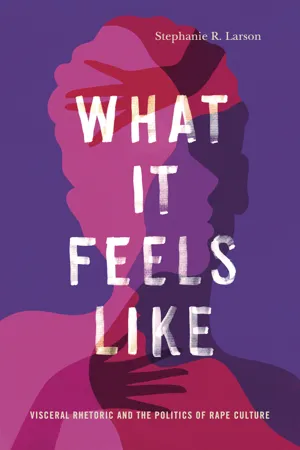
- English
- PDF
- Available on iOS & Android
About this book
What It Feels Like interrogates an underexamined reason for our failure to abolish rape in the United States: the way we communicate about it. Using affective and feminist materialist approaches to rhetorical criticism, Stephanie Larson examines how discourses about rape and sexual assault rely on strategies of containment, denying the felt experiences of victims and ultimately stalling broader claims for justice.
Investigating anti-pornography debates from the 1980s, Violence Against Women Act advocacy materials, sexual assault forensic kits, public performances, and the #MeToo movement, Larson reveals how our language privileges male perspectives and, more deeply, how it is shaped by systems of power—patriarchy, white supremacy, ableism, and heteronormativity. Interrogating how these systems work to propagate masculine commitments to "science" and "hard evidence," Larson finds that US culture holds a general mistrust of testimony by women, stereotyping it as "emotional." But she also gives us hope for change, arguing that testimonies grounded in the bodily, material expression of violation are necessary for giving voice to victims of sexual violence and presenting, accurately, the scale of these crimes. Larson makes a case for visceral rhetorics, theorizing them as powerful forms of communication and persuasion.
Demonstrating the communicative power of bodily feeling, Larson challenges the long-held commitment to detached, distant, rationalized discourses of sexual harassment and rape. Timely and poignant, the book offers a much-needed corrective to our legal and political discourses.
Frequently asked questions
- Essential is ideal for learners and professionals who enjoy exploring a wide range of subjects. Access the Essential Library with 800,000+ trusted titles and best-sellers across business, personal growth, and the humanities. Includes unlimited reading time and Standard Read Aloud voice.
- Complete: Perfect for advanced learners and researchers needing full, unrestricted access. Unlock 1.4M+ books across hundreds of subjects, including academic and specialized titles. The Complete Plan also includes advanced features like Premium Read Aloud and Research Assistant.
Please note we cannot support devices running on iOS 13 and Android 7 or earlier. Learn more about using the app.
Information
Table of contents
- COVER Front
- Copyright Page
- Table of Contents
- Preface: The Problem with Origin Stories
- Notes to Preface
- acknowledgments
- introduction
- Notes to Introduction
- Chapter 1: sensing the nation at risk: sexual citizenship and the meese commission
- Notes to Chapter 1
- Chapter 2: The specter of patriarchy
- Notes to Chapter 2
- Chapter 3: The proof is in the body: transcending rhetoric with rape kits
- Notes to Chapter 3
- Chapter 4: Disrupting silence: the law and visceral counterpublicity
- Notes to Chapter 4
- Chapter 5: Taking it all in: #metoo, feminist megethos, and list making
- Notes to Chapter 5
- Conclusion: “I was trapped in my body”: writing and living after rape
- Notes
- Bibliography
- Index